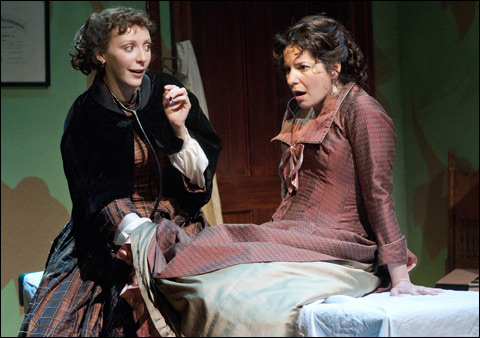
BALANCING ACT: Marianna Bassham and Anne Gottlieb help deliver The Vibrator Play’s exquisite laughs as well as its sharp take on science, sex, and love. |
Sarah Ruhl, the goddess of theatrical quirkiness, is back in Boston, and this time SpeakEasy Stage Company has its adventurous mitts on her. This is no small feat, since in the past, New Repertory Theatre and the Lyric Stage Company have battled to be the first kids on the Boston block to stage her un-PC but resolutely feminist plays.
And who, save for family and community theaters, wouldn't want dibs on a work called The Vibrator Play — or, as it's more politely known, In the Next Room (or The Vibrator Play). Particularly when it's as good as this one (at the Boston Center for the Arts through October 16).
I have not been as enamored of Ruhl's post–Clean House plays as most. Eurydice seemed overcooked, Dead Man's Cell Phone underdeveloped. But she gets the balance right again here. If In the Next Room isn't as fanciful as Clean House, with its separate but intertwining realities, that's probably to the good, since the subject matter is playful enough: the Victorian belief of some pioneering physicians that female "hysteria" could be cured by electrical stimulation in the nether regions. Freud would later take things farther with his famous dictum that sometimes a cigar is just a dildo.
More to the point, as far as Ruhl is concerned, is Freud's befuddlement — he was hardly alone here — about what women want. The man with the vibrator in this 1880s-set play, Dr. Givings, is clueless about what the stimulation has to do with women's sexual desires. Not that he's a sexist cad — his patients and his wife are equally clueless. They simply know it feels g-o-o-o-o-d, and all those little wet spots just come with the supposedly asexual territory.
The stimulation, of course, gives rise to any number of those "I'll have what she's having" moments. It becomes kind of a sit-com cross between I Love Lucy and Desperate Housewives, particularly when Lucy and Ethel — I mean, Catherine (Anne Gottlieb) and Sabrina (Marianna Bassham) — sneak into the doctor's office to conduct a scientific experiment on each other.
Ruhl isn't the only thespian sought after by local theaters. Gottlieb and Bassham are two of the most accomplished leading ladies in town, and here they prove they can fake an orgasm with Meg Ryan one moment and voice their frustrations with married life the next. And when Scott Edmiston is directing, it's a bona fide event in its own right. The History Boys and Five by Tenn remain his two best SpeakEasy stagings; this one wins the bronze.
It must have been tempting to stage In the Next Room as a knockabout farce, with all the comings and goings leading from the nicely appointed living room to the "Next Room," the doctor's office where things get juicy. But though the production is often exquisitely funny, Edmiston and company know that going too far in that direction would undercut Ruhl's delicate balance of science, sex, and love.
Edmiston, Gottlieb, and Bassham don't have all the fun. Derry Woodhouse as the closed-down Dr. Givings — a notable Satan in SpeakEasy's production of Conor McPherson's The Seafarer — and Frances Idlebrook as his nurse are as strong as the female leads. Idlebrook is particularly heartrending in one scene I won't give away. And where Edmiston goes, first-rate design teams always follow.
The music in the final scene could have been less schmaltzy — the moment doesn't need any added transcendence. People were finally beginning to ask for what they wanted and needed. Ruhl and SpeakEasy capture those good vibrations.